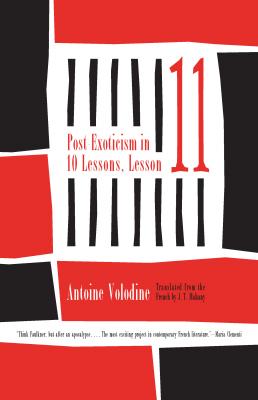inserted into the real reality, elsewhere rather than in fiction. Let us say, in order to simplify, that Lutz Bassmann was our spokesperson to the end, both his and that of everyone and everything. There have been several spokespeople: Lutz Bassmann, Maria Schrag, Julio Sternhagen, Anita Negrini, Irina Kobayashi, Rita Hoo, Iakoub Khadjbakiro, Antoine Volodine, Lilith Schwak, Ingrid Vogel. This list contains deliberate errors and is incomplete. It follows the post-exoticist principle according to which a portion of shadow always subsists in the moment of explanation or confession, modifying the confession to the point of rendering it unusable to the enemy. To objective appearances, the list is only a sarcastic way of telling the enemy one more time that they will learn nothing. For the enemy is always part stalker, disguised and vigilant among readers. We must continue to speak in a way that denies the enemy any profit. We must do this even as we testify before a tribunal whose authority we do not recognize. We devise a solemn proclamation, in a language that appears to be the same as that of the judges, but it is one that the judges listen to with dismay or boredom, as they are incapable of making sense of it . . . We recite it for ourselves and for men and women not present . . . Our remarks coordinating in no circumvention of phrase with the magistrates’ understanding . . . There was nothing extraordinary about the rain that sounded and rang out in Bassmann’s agony during this period; it was completely expected in the month of April. In this region, touched by the tail end of the monsoons, we were in the habit of associating springtime not with green rebirth as is the tradition in occidental literature, but with the slow and loud din of the deluge, mugginess, and mephitic atmospheres. Inside the prison, pestilences alter in intensity by the second as they circulate in an unpredictable manner that prevents any immunization. A feeling of suffocation tormented us from dawn-to-dawn. It is not surprising to discover that psychosomatic illnesses spring up during this phase of the prison calendar. Added to the respiratory troubles are the troubles of solitude. It was extremely difficult for us to converse between cells, on account of all the background noise, from the monotonous sweeping and the trickling that kept on at every hour, muddying the content of our messages. That year, the “we” was, even more than normally, a literary lie, as much a convention of fiction as Lutz Bassmann was alone. Now he was alone. He had reached the moment of our common adventure that several of us had described, in books completed or otherwise, as that of ultimate defeat. When the last surviving member on the list of the dead—and, this time, it was Bassmann—stammered his final syllable, then, on this side of the story as well as beyond it, only the enemy would keep strutting straight ahead, undefeated, invincible, and, among the victims of the enemy, no spokesperson would now dare come to interpret or reinterpret any of our voices, or to love us. Lucid despite the split personalities corrupting his agony, Bassmann sought only to communicate with the deceased. He no longer tapped on the washbasin pipes or on the door, saying, for example, “Calling cell 546,” or on the sealed siphon behind the
1. Fragmentary Inventory of Deceased Dissidents
Arostegui, Maria (1975)*
Bach, Matthias (1991)
Bartok, Giovan (1991)
Bassmann, Lutz (1990)
Bedobul, Kynthia (1988)
Breughel, Anton (1975)
Breughel, Istvan (1985)
Campanini, Giuseppe (1988)
Clementi, Maria (1975)
Damtew, Oleg (1998)
Dawkes, Ellen (1990)
Domrowski, Monika (1998)
Draeger, Manuela (2001)
Echenguyen, Irena (1981)
Echenguyen, Maria (1976)
Fincke, Elia (1998)
Garcia Muñoz, Maria (1985)
Gardel, Wolfgang (1975)
Gompo, Khrili (1980)
Heier, Barbara (1991)
Henkel, Maria (1980)
Hinz, Mario (1998)
Hoo, Rita (1992)
Iguacel, Maria (1975)
Khadjbakiro, Iakoub (1977)
Khorassan, Jean (1996)
Kim, Petra (1992)
Kobayashi, Irina (1991)
Koenig, Astrid (1990)
Kronauer, Elli (1999)
Kwoll, Maria (1975)
Lethbridge, William (1992)
Lukaszczyk, Vassilissa (1987)
Malaysi, Jean (1979)
Malter, Hugo (1990)
Marachvili, Türkan (1992)
Marconi, Ivo (1992)
Mayayo, Erdogan (1998)
Nachtigall, Roman (2000)
Negrini, Anita (1977)
Nordstrand, Verena (1986)
Ossorguina, Raïa (1986)
Ostiategui, Leonor (1996)
Ostiategui, Pablo (1996)
Peek, Marina (1998)
Petrokian, Aram (1992)
Pizarro, Hans-Jürgen (1998)
Reddecliff, Dimitri (1990)
Retsch, Dorothea (1975)
Retzmayer, Rita (1979)
Retzmayer, Zeev (1976)
Samarkande, Maria (1978)
Santander, Monika (1982)
Sauerbaum, Maria (1996)
Schnittke, Maria (1980)
Schrag, Maria (1975)
Schwack, Lilith (1979)
Sherrad, Aidan (1990)
Soledad, Irena (1977)
Soudayeva, Maria (1975)
Sternhagen, Julio (1975)
Tarchalski, Yasar (1990)
Thielmann, Maria Gabriella (1992)
Thielmann, Ralf (1982)
Velazquez, Sonia (2000)
Vlassenko, Jean (1987)
Wallinger, John (1991)
Weingand, Anita (1986)
Wernieri (1975)
Wolff, Rebecca (2001)
Wolguelam, Jean (1975)
Zhang, Yann (1977)
* Year in parentheses indicates date of incarceration at high-security sector.
toilet bowl, asking for cell 1157, or on the bars of the window, saying “Bassmann here . . . please respond . . . Bassmann is listening . . . please respond . . .” Now he knocked nowhere. He concentrated his gaze on us, the photographs of those who had preceded him in disappearing, and he made the smallest of murmurs pass through his lips, pretending not to be dead and reproducing a whispering technique that the most tantric among us had many a time used in their romånces: with an audible exhalation, the narrator prolongs, not his or her own existence, but the existence of those who are going to dwindle into nothing, whose memory can only be preserved by the narrator. Word by word, moan after moan, Lutz Bassmann struggled to make last the mental edifice that would
